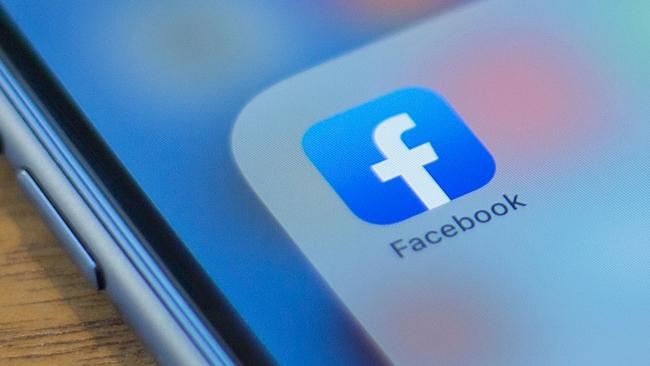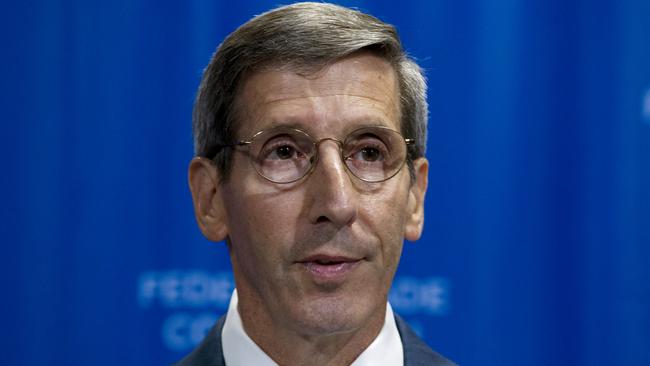Facebook cops $US5 billion fine ($7bn) for privacy violations
US regulators slap Facebook with a record fine for privacy violations as the company posts strong growth.

Facebook pushed past a record-setting privacy fine in the second quarter, posting strong earnings that show the resilience of its social-media empire despite persistent negative headlines.
The tech giant recorded $US16.9 billion in revenue, up 28 per cent from a year ago. The company posted $US2.6 billion in profit, or $US0.91 a share, reflecting a one-time $US2 billion charge as part of its $US5 billion settlement with the Federal Trade Commission and an accounting change regarding tax deductions for stock-based compensation.
Without those two charges, the company would have earned $US1.99 a share, beating analysts’ expectations of $US1.88.
Facebook’s results show the duality defining the company at the moment: It is a punching bag for critics, who pummel it for repeated privacy missteps and misinformation on its platforms, yet it is a darling of investors, who prize the earning power of its targeted advertising.
The company’s stock has risen more than 50 per cent since the beginning of the year, despite a pile of regulatory and legal challenges and a skeptical reception for its plan to lead the creation of a global cryptocurrency known as Libra.
Facebook shares climbed more than 3 per cent in after-hours trading.
The FTC settlement puts new guard rails around Facebook’s management and how it approaches privacy, but it didn’t severely curtail the company’s data collection and its ability to sell ads based on it.
Facebook’s earnings filings note that the FTC isn’t done with it: Facebook warned investors that the FTC launched an antitrust investigation of the company in June. That probe will run along the Justice Department’s investigation announced Tuesday, which Facebook said was an antitrust review of “market-leading online platforms.”
The earnings report demonstrated continued growth in Facebook’s “blue” app, its oldest and largest product. The company said 1.59 billion accounts used Facebook daily, with 2.41 billion accessing Facebook monthly.
Globally, more than 2.7 billion people use at least one Facebook product monthly.
“We had a strong quarter and our business and community continue to grow,” Mark Zuckerberg, Facebook co-founder and chief executive, said in a statement. “We are investing in building stronger privacy protections for everyone and on delivering new experiences for the people who use our services.”

Facebook’s operating margin fell to 27 per cent as costs rose to $US12.26 billion from $US7.37 billion a year ago, primarily reflecting the one-timecharges. The company has warned it expects costs to rise as a result of increased spending on content moderation and regulatory compliance, though the company has avoided the sort of spending that Chief Financial Officer David Wehner warned last year could consistently drag down its margins.
While the adjusted earnings surpassed most analyst estimates, all had predicted steady growth, reflecting Wall Street’s confidence that Facebook’s financial performance would continue to diverge from the company’s reputational issues.
Evidence that Russian agents sought to influence the US 2016 presidential election brought heavy scrutiny to Facebook in 2017, and a series of user data leaks and privacy gaffes have dogged the company since. Debates about whether to breakup Facebook and other tech giants arose in the Democratic primary earlier this year and are likely to play out on cable news throughout much of the next 15 months, while the Justice Department’s and the FTC’s antitrust probes are now being considered.
None of these controversies have changed Facebook’s dominance of social media, which is furthered by the popularity of its other platforms, Instagram and WhatsApp.
Some of the risks around Facebook’s rocky trajectory were evident in its rollout of Libra, an ambitious new cryptocurrency aimed at average consumers. In congressional hearings earlier this month, lawmakers said they would insist on strict oversight of the new digital money and questionedwhether the company had earned the trust such a project requires.
Facebook agrees to pay $5bn in FTC settlement
Facebook Inc agreed to pay a record $US5 billion fine and better police its data-privacy practices to settle a long-running federal investigation that has damaged the company’s standing with consumers and clouded its future.
Under the settlement, Mr Zuckerberg will be required to certify that the company is in compliance with new privacy strictures, and could be subject to civil and criminal penalties for false certifications.
“The $5 billion penalty against Facebook is the largest ever imposed on any company for violating consumers’ privacy and almost 20 times greater than the largestprivacy or data security penalty ever imposed worldwide, ” the Federal Trade Commission said. “It is one of the largest penalties ever assessed by the US government for any violation.” But the force of the decision was blunted by stinging dissents from the two Democrats on the five-member commission, who said the financial penalty was insufficient and the settlement does littleto change Facebook’s basic incentives to gather and leverage users’ data.
“The settlement imposes no meaningful changes to the company’s structure or financial incentives, which led to these violations,” commissioner Rohit Chopra said. “Nor does it include any restrictions on the company’s mass surveillance or advertising tactics.”
“Rather than accepting this settlement, I believe we should have initiated litigation against Facebook and its CEO Mark Zuckerberg,” said commissioner Rebecca Kelly Slaughter.
Noting the dissents, the commission’s Republican majority led by Chairman Joe Simons said that suing Mr Zuckerberg for past violations wouldn’t serve the public interest.
“Mr. Zuckerberg will be held accountable for certifying quarterly — under threat of civil and criminal penalties — that the company’s privacy program is in compliance with the order,” the FTC’s majority wrote. “The relief we have achieved today solves concrete problems, rather than venting frustration with individuals.” Facebook’s general counsel, Colin Stretch, said the agreement “will mark a sharper turn toward privacy, on a different scale than anything we’ve done in the past.”
Separately Wednesday, the Securities and Exchange Commission announced a settlement with Facebook —- including a $US100 million fine — over claims it misled investors about the misuse of customer data. Facebook neither admitted nor denied the SEC claims. The company said it shares the regulator’s view that it be “transparent withour investors about the material risks we face, and we have already updated our disclosures and controls in this area.” Facebook neither admitted nor denied the SEC claims. The company said it shares the regulator’s insistence that it be “transparent with our investors about the material risks we face, and we have already updated our disclosures and controls in this area.” The federal probe began more than a year ago after disclosures that data on tens of millions of Facebook users had been improperly transferred to a political data-analytics firm, Cambridge Analytica, that did work for Donald Trump’s 2016 presidential campaign.
After seeking to determine when Facebook learned that an academic researcher had transferred user data to Cambridge Analytica in violation of the social network’spolicies, investigators alleged that more than 30 Facebook employees, including senior managers, eventually became aware that had occurred, the SEC said. Yet the company in 2016 and 2017 made only generic disclosures to investors about potential data-privacy risks, instead of being specific about what hadhappened, the agency said.
Facebook even misled reporters who inquired about the company’s own investigation of Cambridge Analytica, telling journalists in 2017 that it hadn’t uncovered any indications of wrongdoing, the SEC’s order alleges. Those statements reinforced the inaccuratepicture that Facebook’s investor disclosures painted, the SEC said.
FTC enforcement director James Kohm, meanwhile, told reporters Wednesday that he expected implementing the settlement would be extensive and costly for Facebook.
FTC Commissioner Noah Phillips said the Facebook settlement doesn’t necessarily apply to other companies, but all firms should consider elevating privacy concerns to board level. The Facebook fine raises the price of privacy violations by any company, he said.
Mr. Zuckerberg, in a Facebook post Wednesday, said evaluating privacy risks to the FTC’s standards “will take hundreds of engineers and more than a thousand people across our company” and could add time to bringingnew products to market.
The settlement with the FTC requires creation of a new committee of Facebook’s board to monitor the company’s privacy practices. Legal experts said they couldn’t recall prior FTC privacy settlements imposing such a requirement.
“If the committee had appropriate authority and was answerable to the FTC, it could have a significant impact,” David Vladeck, a former head of the agency’s consumer protection bureau during theObama administration, said on Monday before the agreement’s announcement.
The FTC’s investigation found more problems, Mr. Chopra said in his dissent, including Facebook misrepresenting its user settings and privacy tools to lure users into sharing information.
“The investigation also uncovered additional violations, including false assurances to users that they would need to opt into facial recognition, ” he said. “In addition, Facebook encouraged users to turn over their phone numbers for security purposes, but used those phone numbers to feed the company’ssurveillance and advertising business.” The lack of bipartisan agreement on the settlement within the FTC sends the wrong message to tech companies, Sens. Ed Markey (D., Mass.), Josh Hawley (R., Mo.) and Richard Blumenthal (D.,Conn.) said in a letter to the FTC after some details of the settlement were disclosed earlier this month.
They told the agency they expected “strict structural reforms and managerial accountability that would put an end to Facebook’s privacy invasions.” Lawmakers of both parties as well as Mr. Trump have gone on the offensive over various concerns relatingto some tech companies’ immense size and influence, as well as their perceived intrusiveness in people’s lives. That reflectsbroader unhappiness in Washington over Big Tech, and particularly internet companies such as Facebook and Alphabet Inc.’s Google unit.
For Facebook, the FTC settlement appeared unlikely to have much immediate impact on its lucrative business model. The company earns almost allits profits from selling advertising that targets users based on their online behavior.
But the deal also appeared unlikely to improve the company’s image after being tarnished during the investigation.
When a March Wall Street Journal/NBC News poll asked Americans how much they trusted huge tech firms to protect their personalinformation, Facebook scored the worst, with 60% responding they trusted the company “not at all.” That compared with 37% for Google and 28% forAmazon.com Inc.
The investigation and settlement also appear likely to heighten scrutiny of Mr. Zuckerberg, although the company succeededin softening FTC efforts to target him individually.
The federal probe has contributed to raising focus on other alleged privacy missteps by the company that is likely to continue.Even as the FTC settlement was being completed this week, for example, new questions were being raised over potential risks to children fromits Messenger Kids app.
The settlement could fuel a growing partisan debate over online privacy. To the extent lawmakers aren’t satisfied by the deal,that may make both the FTC and Facebook targets during the 2020 campaign. It could also bolster efforts in Congress to grant more privacy authority to the FTC or another agency, although such legislation is currently stalled.
John D. McKinnon, Ryan Tracy and Dave Michaels contributed to this article.
The Wall Street Journal



To join the conversation, please log in. Don't have an account? Register
Join the conversation, you are commenting as Logout